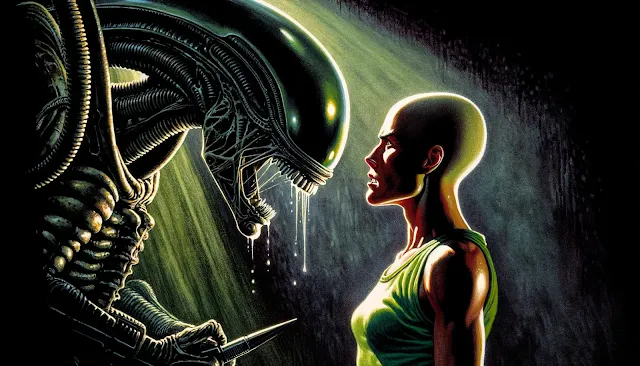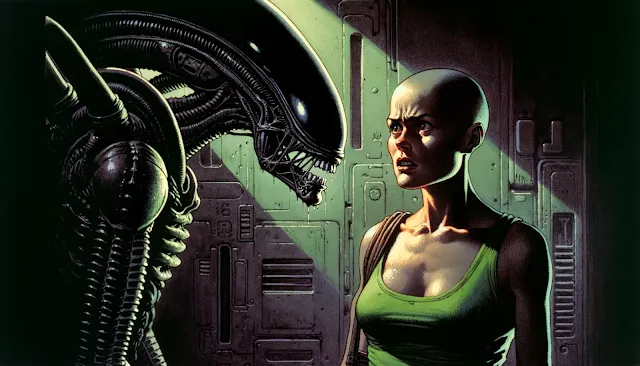Directed by David Fincher, "Alien 3" takes a darker turn, setting itself apart with a grim atmosphere and a return to the horror roots of the series.
A central mystery in "Alien 3" revolves around why the alien takes an unusually long time to gestate within Ripley compared to previous hosts. This anomaly is not just a minor plot detail but a significant element that affects the character's journey and the movie's storyline.
The extended gestation period serves the film's narrative by allowing Ripley to develop further as a character and to face her destiny. It adds a layer of tragic inevitability to her journey, highlighting themes of sacrifice and the relentless cycle of life and death.
We can dance around the point forever but ultimately, the timing of the gestation period is dictated by the needs of the plot.
The story picks up with Ellen Ripley, the saga's heroine, crash-landing on Fiorina "Fury" 161, a desolate planet housing a penal colony where the prisoners practice their faith. The film introduces new challenges for Ripley, including the revelation of a Xenomorph presence on the planet and a devastating personal discovery.
A central mystery in "Alien 3" revolves around why the alien takes an unusually long time to gestate within Ripley compared to previous hosts. This anomaly is not just a minor plot detail but a significant element that affects the character's journey and the movie's storyline.
The extended gestation period contributes to the suspense and the emotional depth of the narrative, raising questions about the biology of the Xenomorphs and the fate of Ripley.
The extended gestation period is pivotal for several reasons. It influences the pace and tension of the story, allowing Ripley time to interact with other characters and to confront her situation. Moreover, this aspect of the plot is crucial for deepening the thematic layers of the Alien series, touching on themes of life, death, and the cycle of creation and destruction.
Before "Alien 3", Ripley faces the Xenomorph threat in "Alien" and "Aliens", surviving against all odds. These encounters showcase her resilience and deepen her understanding of the Xenomorph species, setting the stage for her ultimate confrontation in "Alien 3".
The Xenomorphs are characterized by a complex life cycle, starting from an egg that releases a facehugger, which then implants an embryo into a host. The embryo gestates before emerging as a chestburster.
The extended gestation period is pivotal for several reasons. It influences the pace and tension of the story, allowing Ripley time to interact with other characters and to confront her situation. Moreover, this aspect of the plot is crucial for deepening the thematic layers of the Alien series, touching on themes of life, death, and the cycle of creation and destruction.
Before "Alien 3", Ripley faces the Xenomorph threat in "Alien" and "Aliens", surviving against all odds. These encounters showcase her resilience and deepen her understanding of the Xenomorph species, setting the stage for her ultimate confrontation in "Alien 3".
The Xenomorphs are characterized by a complex life cycle, starting from an egg that releases a facehugger, which then implants an embryo into a host. The embryo gestates before emerging as a chestburster.
Prior to "Alien 3", this process typically progresses rapidly, but Ripley's case deviates from the established norm.
In-universe explanations suggest Ellen may be infected with a queen xenomorph and such an embryo's uniqueness might account for the prolonged gestation.
In-universe explanations suggest Ellen may be infected with a queen xenomorph and such an embryo's uniqueness might account for the prolonged gestation.
That is if it was a queen in Ripley...
The extended gestation period serves the film's narrative by allowing Ripley to develop further as a character and to face her destiny. It adds a layer of tragic inevitability to her journey, highlighting themes of sacrifice and the relentless cycle of life and death.
We can dance around the point forever but ultimately, the timing of the gestation period is dictated by the needs of the plot.
"Alien 3" is designed to bring Ripley's saga to a close, with her sacrifice embodying the themes of the series. The gestation timeline serves this narrative purpose, emphasizing that in the Alien universe, human experiences and struggles are intertwined with the incomprehensible life cycles of the Xenomorphs.
Ripley's prolonged gestation and eventual fate underscore the series' exploration of survival, sacrifice, and the complex interplay between human and alien life.

















